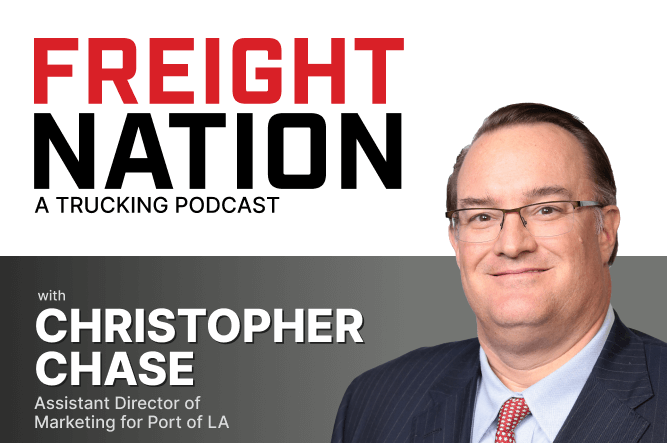Podcast: Christopher Chase on the Red Sea Crisis

Listen up!
Check out our trucking podcast, Freight Nation.
Trucking, shipping, or air freight, no matter where you sit within the transportation world, one thing rings true: it is all connected on a global scale. Shipping is currently being affected by the ongoing crisis in the Middle East, and people are wondering how it will impact the rest of the freight world.
In this episode, Christopher Chase, Assistant Director of Marketing for the Port of Los Angeles, sits down with Truckstop Chief Relationship Officer, Brent Hutto, to assess freight disruptions on the waterways and the ongoing Red Sea crisis’s impact on shipping operations.
Managing Risks and Challenges
Amid geopolitical crises, supply chain shifts like COVID-19, and issues like congestion on the Panama Canal, shippers must prioritize agility and velocity to prevent disruptions.
“And that’s what we keep an eye on, especially now even more so, is focusing on that velocity. We knew it was always important, but it’s the velocity at a warehouse, the velocity of a truck moving from A to B, velocity of a rail. It has to keep moving. If it slows down, we’re okay. It just can’t stop.”
When it comes to water issues specifically, which directly affect freight movement on land, there is a tipping point to make decisions. You have to evaluate what is happening and assess short-term versus long-term problems to make the most informed next steps.
Christopher emphasizes that safety is the most important consideration, no matter what.
“Safety first, always safety first, like it is in all the industries, safety first, and then we get into things like, well, what is your goal? What is the need of your customer base, or where do you need to get this cargo to?”
Only after considering your team’s safety, can you assess how best to meet your customers’ needs and your primary business goals. Everything comes down to one calculation: speed, distance, risk, and your business and customer needs. Then, you can find the best solution for managing this crisis.
Disruption in the Red Sea
The Red Sea attacks are part of the broader conflicts across the Middle East, specifically the military action taking place in the Israel-Gaza conflict. Since the October 2023 attacks, the leadership in Yemen has taken the view that any ships in the area could be supporting Israel and are thus using shore-to-ship missiles to shoot at vessels. Due to their size in a relatively narrow body of water, ships have been more easily targeted. In order to protect cargo, many ships are choosing longer routes to avoid disastrous consequences.
The situation in the Red Sea is disrupting cargo shipping, but the full impact on the Port of LA is still unfolding. Decisions on rerouting and port usage will depend on individual cargo needs and market conditions in the coming months. However, Chase speculates this will have a much bigger impact on the European economy and cargo volumes than that of the United States.
“As the import contracts tend to expire or change over around that April-May timeframe, the geopolitical scene then, and what’s happening in terms of, you know, in that whole area of the Red Sea in the Middle East, that will make a difference on probably how people do this.”
Prices have increased and plateaued, and it now seems like a waiting game for the next change, such as the potential impact on the trucking world.
*Please note: the topics discussed in this episode are fast-changing. All information was accurate at the time of recording.
To learn more about how ocean freight impacts the supply chain, tune into this episode of Freight Nation: A Trucking Podcast on Apple, Spotify, or your favorite podcast platform.
Topics:
Get helpful content delivered to your inbox.
Sign up today.
Find high-quality loads fast, get higher rates on every haul, and access tools that make your job easier at every turn.






